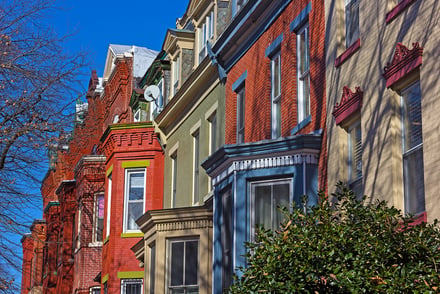Does your old home have a history? Many of the old brick houses and neighborhoods in the Washington DC area have stories to tell. One way to get the official recognition of your home’s connection to important periods in history is to get a historic designation. What exactly is a designation and what is involved in the process?
The Merriam-Webster Dictionary defines designate as ”to point out the location” and “to distinguish as to class.” Regardless of where you live, it basically comes down to whether or not your property has significance. What does significance mean in this context?
Historic Designation in Washington DC: Criteria
- History – History happened here. Meetings about the Underground Railroad or women’s suffrage took place in your house.
- Event – Similar to History (see above). An important treaty was signed there, it was a stop on the Underground Railroad (especially if there is still access to the tunnels used for that purpose), or there was a speakeasy in the basement during Prohibition.
- Individuals – Someone famous lived, worked, studied, or died there.
- Architecture and Urbanism – It’s a good, and often obvious, example of a style of architecture, kind of construction, engineering, landscaping and/or neighborhood pattern.
- Artistry – It’s very, very beautiful and thus helps beautify your neighborhood and Washington DC as a city.
- Work of a Master – Someone famous designed or otherwise worked on your house in some fashion: architect, craftsperson, sculptor, builder, landscape architect, engineer, and urban planner.
- Archeology – You (or someone working on your property) unearthed something – often pottery shards, arrowheads, or bones - that will help us better understand the past.
Historic Designation in Washington DC: How to Apply
If you live in Washington DC, you’d be going through Historic Preservation Office (HPO). For example, getting your home or property designated in Washington DC requires you to present documentation of it as historic to the Historic Preservation Review Board (HPRB). (It’s worth noting that in Washington DC a neighbor or local neighborhood organization can submit your property for designation. They're not required to inform you that they did that, but hopefully, they will.)
If you live in Alexandria, you would be working with the city's Department of Planning & Zoning. The general process tends to be pretty similar in most municipalities. Once designated locally, your property may be recommended for designation at the state or national level.
Why Designate?
To start with there are the knowledge and satisfaction that come from living someplace that has a real history to it (as opposed to a soulless McMansion or cookie cutter apartment building). Sometimes there’s also a plaque for the front of your house, as well as it becoming a stop on a local walking tour. But there’s another valuable reason.
Money. With designation comes eligibility for a variety of funding that you can use to improve or sustain your property that you wouldn’t have access to if it weren’t designated.
- If you want to fix up your house or do more intensive research about its history, the formal designation means that it is eligible for preservation grants. The amounts vary.
- If your property is income producing and you don’t live in it, it may also be eligible for Federal Historic Preservation Tax Credits.
- There is also the possibility of benefiting from a mortgage insurance program for rehabilitation loans for your historic property.
Why Not Designate?
Renovations become more complicated (aka ‘rules and paperwork’). As the steward of a designated property, you have to comply with local design guidelines, most often for the home’s exterior. So you can’t just tack on a super modern, glass and steel top floor or change out the wooden railing on the front porch for something metal without going through the necessary channels and doing the required paperwork. Or, you also might not like walking tours gathering outside your house.
Designated Historic District
Some properties are situated within a historic district but not individually designated. What this often means, especially in residential areas, is that the neighborhood has standards regarding look and feel. As mentioned earlier, this can help ensure that your next-door neighbor won't do something garish to their home and thus negatively impact your property values. People who own homes within historic districts can also be eligible for similar specialized funding and tax credits that you can get with a designated house.
Renaissance Development, a leader in brick restoration and historic preservation, specializes in tuckpoionting - the repair and restoration of historic DC brick homes. We love old homes and are committed to preserving their historic charm and value. If your renovation plan includes masonry or brick repair, contact us for a free site visit and project quote.
Tags:
Historic PreservationMay 17, 2018 1:41:44 PM



